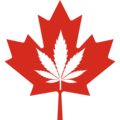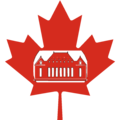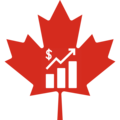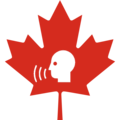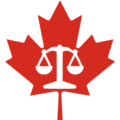Portal:Canada
| Showcase | Contents | Contributing |
Introduction
Canada is a country in North America. Its ten provinces and three territories extend from the Atlantic Ocean to the Pacific Ocean and northward into the Arctic Ocean, making it the world's second-largest country by total area, with the world's longest coastline. Its border with the United States is the world's longest international land border. The country is characterized by a wide range of both meteorologic and geological regions. With a population of just over 41 million people, it has widely varying population densities, with the majority residing in urban areas and large areas of the country being sparsely populated. Canada's capital is Ottawa and its three largest metropolitan areas are Toronto, Montreal, and Vancouver.
A developed country, Canada has a high nominal per capita income globally and its advanced economy ranks among the largest in the world by nominal GDP, relying chiefly upon its abundant natural resources and well-developed international trade networks. Recognized as a middle power, Canada's strong support for multilateralism and internationalism has been closely related to its foreign relations policies of peacekeeping and aid for developing countries. Canada promotes its domestically shared values through participation in multiple international organizations and forums. (Full article...)
Featured article -
The École Polytechnique massacre (French: tuerie de l'École polytechnique), also known as the Montreal massacre, was an antifeminist mass shooting that occurred on December 6, 1989, at the École Polytechnique de Montréal in Montreal, Quebec, Canada. Fourteen women were murdered; another ten women and four men were injured.
The perpetrator was 25-year-old Marc Lépine, armed with a legally obtained Ruger Mini-14, 30-round high-capacity magazines, and a hunting knife. He began his rampage at a mechanical engineering class at the École Polytechnique, where he separated the male and female students, ordering the men to leave. He shot all nine women in the room, killing six. For nearly 20 minutes the shooter moved through corridors on multiple floors of the building, the cafeteria, and another classroom, targeting women. He wounded more students and killed eight more women before fatally shooting himself. (Full article...)
Current events
- April 3, 2025 – Tariffs in the second Trump administration
- Multinational car manufacturer Stellantis announces it will lay off 900 workers across five of its U.S. factories and will pause production at assembly plants in Canada and Mexico in response to the tariffs. (Reuters)
- April 3, 2025 – Canada convoy protests
- The Ontario Court of Justice in Ontario, Canada, convicts Tamara Lich and Chris Barber, two leaders of the truck driver protest movement against COVID-19 vaccination in Canada, of criminal mischief. (AP)
- April 2, 2025 – Tariffs in the second Trump administration
- China–United States trade war, 2025 United States trade war with Canada and Mexico
- Exceptions include Canada, Cuba, Mexico, North Korea, and Russia. Canada and Mexico had tariffs placed on them in February, while Cuba, North Korea, and Russia are under U.S. sanctions. (BBC News) (France 24) (India Today)
- The United States Senate votes 51–48 on a non-binding resolution to rebuke and reverse tariffs on Canada, with Republicans Rand Paul, Susan Collins, Lisa Murkowski, and Mitch McConnell voting for the resolution. (NPR)
- March 29, 2025 – Protests against Donald Trump
- Protests are held at Tesla dealerships across the United States, Canada, and Europe to protest against DOGE chief and Tesla CEO Elon Musk's role in the second Trump administration. (Taipei Times) (AP)
Selected panorama -
National symbol -

Canada Day, formerly known as Dominion Day, is the national day of Canada. A federal statutory holiday, it celebrates the anniversary of Canadian Confederation which occurred on July 1, 1867, with the passing of the British North America Act, 1867, when the three separate colonies of the United Canadas, Nova Scotia, and New Brunswick were united into a single dominion within the British Empire called Canada. (Full article...)
Selected vital article -

Religion in Canada encompasses a wide range of beliefs and customs that historically has been dominated by Christianity. The constitution of Canada refers to 'God', however Canada has no official church and the government is officially committed to religious pluralism. Freedom of religion in Canada is a constitutionally protected right, allowing individuals to assemble and worship without limitation or interference. Rates of religious adherence have steadily decreased since the 1960s. After having once been central and integral to Canadian culture and daily life, Canada has become a post-Christian state. Although the majority of Canadians consider religion to be unimportant in their daily lives, they still believe in God. The practice of religion is generally considered a private matter throughout society and the state. (Full article...)
Selected picture -
Featured biography -
David Lewis CC QC (born David Losz; June 23 or October 1909 – May 23, 1981) was a Canadian labour lawyer and social democratic politician. He was national secretary of the Co-operative Commonwealth Federation (CCF) from 1936 to 1950 and one of the key architects of the New Democratic Party (NDP) in 1961. In 1962, he was elected as the Member of Parliament (MP), in the House of Commons of Canada, for the York South electoral district. While an MP, he was elected the NDP's national leader and served from 1971 until 1975. After his defeat in the 1974 federal election, he stepped down as leader and retired from politics. He spent his last years as a university professor at Carleton University and as a travel correspondent for the Toronto Star. In retirement, he was named to the Order of Canada for his political service. After suffering from cancer for a long time, he died in Ottawa in 1981. (Full article...)
Did you know -

- ... that John Neilson, a Scottish immigrant to Lower Canada, became a major publisher and bookseller, and was reportedly "the largest consumer of paper" in the country?
- ... that Princess Margriet of the Netherlands was born in Canada's capital, but outside the country's legal jurisdiction?
- ... that Robert Home was sent by the British Army to Canada in 1864 to report on the defence of the frontier against the eventuality of an American invasion?
- ... that the first Miss Indigenous Canada contestants were judged on ambassadorship, character, community service, and cultural involvement?
- ... that the inaugural Canadian Premier League match led to the suspension of both team captains?
- ... that journalist W. A. Hewitt refereed the first game played in the history of ice hockey at the Olympic Games?
- ... that Joe Wirkkunen coached the Finland men's national ice hockey team after receiving a recommendation from Canada?
Featured list -
The Vanier Cup (French: Coupe Vanier) is the trophy awarded annually to the champion Canadian football team in U Sports, the governing body for university sports in Canada. The U Sports football champion is determined in a one-game playoff (the Vanier Cup game), played by the winners of the Uteck Bowl and the Mitchell Bowl. In turn, the participating teams are determined by the winners of four bowl games: the Loney Bowl (AUS), Hardy Cup (Canada West), Dunsmore Cup (RSEQ), and Yates Cup (OUA). The Vanier Cup game is played at a neutral site that changes every year; the hosting university is determined months or years in advance. (Full article...)
Main articles
Associated Wikimedia
The following Wikimedia Foundation sister projects provide more on this subject:
-
Commons
Free media repository -
Wikibooks
Free textbooks and manuals -
Wikidata
Free knowledge base -
Wikinews
Free-content news -
Wikiquote
Collection of quotations -
Wikisource
Free-content library -
Wikiversity
Free learning tools -
Wikivoyage
Free travel guide -
Wiktionary
Dictionary and thesaurus







